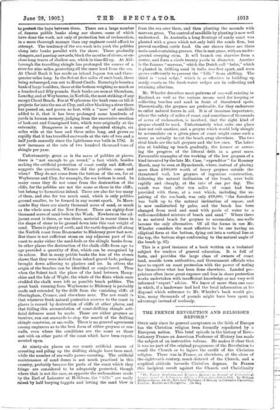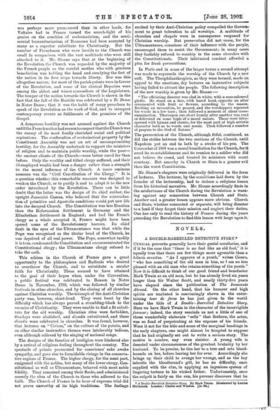THE FRENCH REVOLUTION AND RELIGIOUS REFORM. • ONCE only since its
general acceptance as the faith of Europe has the Christian religion been formally repudiated by a European nation. This brief episode in the history of Revo- lutionary France an American Professor of History has made the subject of an instructive volume. He makes it clear that it was no part of the original programme of the Revolution to assail the Church or to injure the credit of the Christian religion. There was in France, as elsewhere, at the close of the eighteenth century, much distrust of the Church, and a sceptical attitude towards Christian dogmas. In France this incipient revolt against the Church and Christianity History- Columbia University.
was perhaps more pronounced than* in other lands, for Voltaire had in France turned the search-light of his genius on the cruelties of ecclesiasticism, and the senti-
mental humanitarianism of Rousseau had been accepted by many as a superior substitute for Christianity. But the number of Frenchmen who were hostile to the Church was
small in comparison with the vast multitude who were still attached to it. Mr. Sloane says that at the beginning of the Revolution the Church was regarded by the majority of the French people as the careful mother who with gracious benediction was holding the hand and steadying the feet of the nation in its first steps towards liberty. Nor was this
altogether untrue, for most of the parish priests were in favour
of the Revolution, and some of the clerical Deputies were among the ablest and wisest counsellors of the Legislature.
The temper of the nation towards the Church is shown in the fact that the fall of the Bastille was celebrated by a Te Delon in Notre Dame; that it was the habit of many preachers to speak of the Revolution as the work of God, and to interpret contemporary events as fulfilments of the promises of the Gospel.
A dangerous hostility was not aroused against the Church until the French nation had reason to suspect that the Church was the enemy of its most fondly cherished social and political aspirations. The confiscation of ecclesiastical property by the Constituent Assembly was not an act of uncompromising hostility, for the Assembly undertook to support the ministers of religion and to maintain public worship, while the poor— the ancient clients of the Church—were better cared for than before. Only the wealthy and titled clergy suffered, and their ill-employed wealth had been a danger rather than a strength to_ the moral influence of the Church. A more ominous measure was the " Civil Constitution of the Clergy." It is a question whether this remarkable measure was designed to weaken the Church, or to purify it and to adapt it to the new order introduced by the Revolution. There can be little doubt that the latter was the design of its chief author, the upright Jansenist Canine, who believed that the reintroduc- tion of primitive and Apostolic conditions would put new life into the decayed Church. The Constitution was less Erastian than the Reformation Settlement in Germany and the Elizabethan Settlement in England; and had the French clergy as a whole accepted it, France might have been spared some of the Revolutionary horrors. Its chief fault in the eyes of the Ultramontanes was that while the Pope was recognised as the titular head of the Church, he was deprived of all real power. The Pope, somewhat tardily it is true, condemned the Constitution and excommunicated the Constitutional clergy ; the Ultramontane clergy refused to take the oath.
This schism in the Church of France gave a great opportunity to the philosophers and Radicals who desired to overthrow the Church, and to substitute a secular faith for Christianity. These seemed to have attained to the goal of their hopes when, under the Convention, a public festival was celebrated to Reason in Notre Dame in November, 1793, which was followed by similar festivals in other churches, and by the closing of all churches against Christian worship. The triumph of the Anti-Christian party was, however, short-lived. They were beset by the difficulty which has always proved a stumbling-block to the enemies of Christianity. They were unable to find a fit substi- tute• for the old worship. Christian rites were forbidden, Sundays were abolished, and decadis substituted, and these dicadis were celebrated in churches. It was found, however, that lectures on " Civism," on the culture of the potato, and on other similar instructive themes were intolerably tedious, even althmigh relieved by the singing of national songs.
The designs of the fanatics of irreligion were hindered also by a revival of religious feeling throughout the country. The spectacle of priests persecuted for conscience' sake awoke sympathy, and gave rise to formidable risings in the conserva- tive regions of France. The higher clergy, for the most part, emigrated with the nobles, but many of the lower clergy, Con- stitutional as well as Ultramontane, behaved with most noble fidelity. They remained among their flocks, and administered secretly the rites of the Church to those who adhered to the faith. The Church of France in its hour of supreme trial did not prove unworthy of its high traditions. The feelings excited by their Anti-Christian policy compelled the Govern- ment to grant toleration to all worships. A multitude of churches and chapels were in consequence reopened for Christian worship. But persecution did not cease, for the Ultramontanes, conscious of their influence with the people, encouraged them to resist the Government; in many cases they foolishly refused to worship in the same churches with the Constitutionals. Their infatuated conduct afforded a plea for fresh persecutions.
In Paris and in some of the larger towns a second attempt was made to supersede the worship of the Church by a new cult. The Theophilantlwopists, as they were termed, made an appeal to the emotions, dr/ lectures on instructive subjects' having failed to attract the people. The following description of the new worship is given by Mr. Sloane :— " The officiating director was clad in white, with a rose-coloured girdle. He stood on a dais, with bared head, opposite- an altar ornamented with fruit or flowers, according to the season. Reciting an invocation, he paused, and the worshippers repeated his words in a low tone ; then followed a moment of silent cross- examination. Thereupon one short homily after another was, read or on some topic-of a moral nature. These were inter- spersed with hymns and chants, for the most part of high artistic character both as to words and music. Then followed a number of prayers to the God of Nature."
The, persecution of the Church, although fitful, continued, as did the strifes between the two sections of the Church, until.
Napoleon put an end to. both by a stroke of his pen. The Concordat of 1801 was a moral humiliation for the Church, for it owed its re-establishment and its reunion to a soldier who did not believe its creed, and treated its ministers with scant courtesy. But anarchy in Church or State is a greater evil than the worst Constitution.
Mr. Sloane's chapters were originally delivered in the form of lectures. The lecturer, by the conditions laid down by the founder of the lectureship, had to deduce a religious lesson from his historical narrative. Mr. Sloane accordingly finds in the misfortunes of the Church during the Revolution a warn- Mg against any connection between Church and State. Another and a greater lesson appears more obvious. Church and State, whether connected or separate, will bring disaster to a land if they forget their mission and neglect their duties. One has only to read the history of France during the years preceding the Revolution to find this lesson writ large upon it.



















































 Previous page
Previous page